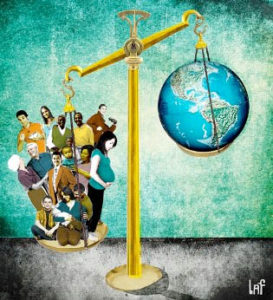 “…our very eyes
“…our very eyes
Are sometimes like our judgments, blind!”
(Cymbeline, act 4, sc. 1)
Comment. By not acknowledging a problem we cannot fix it and as long as it remains invisible it will remain insoluble. In the instance, overpopulation is visible and its effects disastrous, but for reasons due to the sum-total of collective blindness (as per quote), the problem remains unacknowledged and unseen.
Furthermore, overpopulation is, paradoxically, a phenomenon where the extremes of the ideological left and of the right (religious or otherwise) coincide. For the right more people represent an inexhaustible pool of cheap labor. Eventually (and it is already happening), they will already be happy to work for bread like the “rude mechanicals, that work for bread upon the Athenian walls” in Midsummer Night’s Dream. For the left any hint at the problem of overpopulation is the mark of racism and petty-bourgeois mentality, let alone eugenics and other associated aberrations. To this curious and unholy convergence of interests we must attribute the planetary blindness and vacuum in judgment on the frightening consequences of overpopulation.
 Just notice for example this picture near Mumbay airport. Filth and trash are spread all over the ground. And over 100 million people, if not more, living in India cannot access a toilet, but use the land daily. Thus the ground water, the legendary Ganges and all other rivers run in raw sewage. India alone adds a net of 11 million people annually to its 1.21 billion population. India is on its way to becoming the most populated country in the world with 1.6 billion humans living in intractable poverty and hopeless misery.
Just notice for example this picture near Mumbay airport. Filth and trash are spread all over the ground. And over 100 million people, if not more, living in India cannot access a toilet, but use the land daily. Thus the ground water, the legendary Ganges and all other rivers run in raw sewage. India alone adds a net of 11 million people annually to its 1.21 billion population. India is on its way to becoming the most populated country in the world with 1.6 billion humans living in intractable poverty and hopeless misery.
But India is one of many such countries. The earth population has a net increase of 3 humans per second, just short of 100 millions per year. With that huge number of newborn children, the countries giving births to that many people cannot materially educate them even if they wanted to and were governed by the most communist of regimes – nor can they feed them.
The UN estimates that between 10 and 15 million children starve to death annually. But even with 10-15 million of them dying, it leaves 122 million (out of the 137 million babies born each year) to feed, water, house, educate and eventually create work for.
Egypt alone with its 82 million subsisting on desert sands expects to reach 150 million by mid century. Egypt depends on grains from the West to feed its human multitude, but as oil depletes and costs more, Egyptians will not be able to buy food. They face mass starvation.
Hundreds of thousands live on the brink in Somalia, Sudan, Congo, and South Africa. All of Asia lives on the edge. A full one billion human beings worldwide cannot secure a clean glass of water daily. Since developing countries refuse to develop birth-control policies for cultural and religious reasons, they use first-world countries as a human exhaust valve.
But, at some point, countries like the United States, Canada, European countries and Australia will exceed their carrying capacity—resulting in water shortages, food crises, energy depletion and resource exhaustion. Africa, India, Indonesia, Mexico, the Middle East and Bangladesh continue growing their populations without pause.
Bangladesh, with an area about the size of Ohio holds 157 million people. It defies imagination, as equally defies imagination the blindness of the world politicians on the issue.
Yet, any resolution will disrupt the status quo. Given the choice between conflict and change on the one hand, and inertia on the other, the ostrich position seems best. Meanwhile cultivating the illusion that the planet is infinite and that the hunger of billions is only a matter of distribution. And maybe that pollution purifies the air and human waste the water.
User Tips. Comment on a poor decision
In the play. Imogen wakes up from a deep sleep and finds herself near the corpse of the slain Cloten. She is confused and afraid.
Image Source. http://ksj.mit.edu/tracker/2007/12/abc-australia-science-show-overpopulatio
and
Frosty Woodbridge
